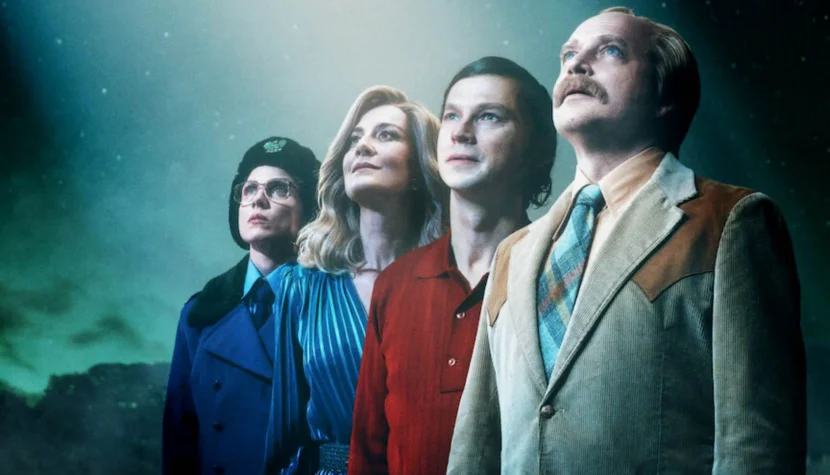PROJECT UFO. Science Fiction Still the Polish Way [REVIEW]

Polish science fiction is like a knockoff of luxury brands from a small-town Manhattan – it shines, looks the part, might even seem genuine from a distance, but something just feels off when you take a closer look at the quality. Project UFO is exactly like that – it even has a unique style, but technically, its narrative falters. The idea seems exceptional by Polish standards, and acting-wise, it’s held together mainly by Piotr Adamczyk. Yet again, something went wrong. The only question is – why? The answer seems clear – it’s not about the budget, but about the mindset around science fiction in the Polish cinema-streaming-TV reality.
Science fiction as a genre is still not independent in Poland. Creators try to enrich their dramas or comedies with sci-fi elements, but the result is often artificial at best. Drama and comedy still dominate as the preferred cinematic expressions, using sci-fi merely as a tool. Genuine genre independence, while it does happen, is marginal. Project UFO isn’t a pure-blood science fiction series either. It’s a mix of satire, drama, and speculative fiction. In terms of sci-fi, nothing is made explicitly clear until… the finale. But even there, you have to wonder – is this really science fiction? Should the theme of the series have been more fictionalized rather than moralized? Because even the comedic angle in the climax isn’t exactly memorable. Are we just a drop in the stream of Polish history? And apparently, you can cut off Lenin’s nose and eat it. Interesting, but the context really needs to be drawn more clearly.

Project UFO is a miniseries, meaning there won’t be any more seasons. The episodes are short. Filming was quick, the scenes brief, often abrupt, making the passage of time in the story sometimes feel drastically compressed, which erodes the atmosphere. And atmosphere in sci-fi is key – it’s the result of a blend between aesthetic style and narrative flow. The narrative in Project UFO rushes the viewer, making it hard to stay connected with the actual story or its suspense. And yet, the creators were handed a story on a silver platter – the Odwiedziny program, which hovered on the edge of mystery about a UFO landing in the Lublin region. Instead of focusing on the aliens, the creators turned their attention to the historical and technical aspects of producing a TV show, thereby stripping the series’ fiction of its dramatic tension. On top of that, the action is set in the 1980s, with a strong aesthetic emphasis on the utopian reality of communism. And this part of the world-building is done with impressive vividness. So even the historical references ended up limiting the sci-fi aspect – or better said, using sci-fi as a vehicle for goals entirely different from those typically pursued by speculative fiction. At times, it felt like the series was still trying to settle some score with a bygone reality.

As for the UFO itself – there’s so little of it that you can’t really speak of any memorable special effects. It certainly won’t entice younger audiences to check out the series. They might even feel that the situational and historical humor offered by Kasper Bajon is overly obscure. One need only compare it with the humor used in 1670 – the difference in boldness, cult potential, and ability to spark associations is obvious. Also, once again we see a notable gap in acting quality between the cast – Piotr Adamczyk left everyone behind, though Adam Woronowicz, Maja Ostaszewska, and Marianna Zydek managed to keep up. Surprisingly, there were no issues with dialogue quality – even in the case of Mateusz Kościukiewicz.

